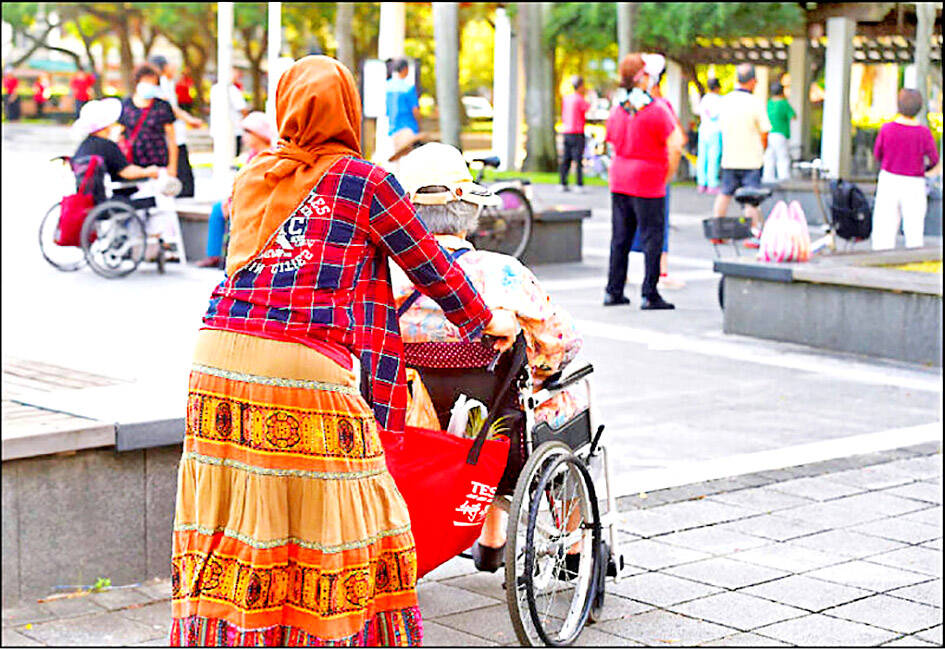The Ministry of Labor yesterday in its annual migrant worker survey said that migrant workers earned an average of NT$33,000 per month last year in the construction and industrial sectors, and NT$24,000 for domestic care work.
The survey was conducted in July and August last year, receiving 8,554 responses — 4,538 from businesses and 4,016 from household employers.
The NT$33,000 monthly salary for those working in the construction and industrial sectors was an increase of NT$2,000 from the previous year, the ministry’s report said.

Photo: Wu Po-hsuan, Taipei Times
Those who worked in the same position for a full year saw an average of NT$15,000 in bonuses, such as holiday pay and performance incentives, it said.
For construction and industrial laborers, the average number of days off in June was 11, an increase of 1.9 compared with the year before, it said.
Average monthly working hours were 179.1, a 13.3-hour decrease compared with 2023, of which 152.2 were regular hours and 26.9 were billed as overtime, it added.
Among employers, 39.7 percent reported issues, with the language barrier being the most common problem, followed by “communication issues,” the report said.
Other complaints such as “poor attitude and discipline,” and workers disappearing were reported by more than 10 percent of employers.
Those who reported issues saw the language barrier as the most common problem, followed by “excessive phone use and chatting,” “communication issues” and “poor attitude and discipline,” it added.
For domestic care workers, the average monthly salary of NT$24,000 was a NT$1,000 increase in regular pay and overtime wages compared with 2023, although that was in part due to June having an extra Sunday compared with the previous year, the ministry said.
Domestic care workers averaged 10.3 hours daily, with 57 percent having days off, while 36.4 percent had one day off per month and 13 percent had two to three days off, it said.
For households employing care workers, 89 percent reported alternative care plans for the caregiver’s days off, of whom 45 percent expressed interest in applying for subsidies for alternative care plans, it said.

The Coast Guard Administration (CGA) yesterday said it had deployed patrol vessels to expel a China Coast Guard ship and a Chinese fishing boat near Pratas Island (Dongsha Island, 東沙群島) in the South China Sea. The China Coast Guard vessel was 28 nautical miles (52km) northeast of Pratas at 6:15am on Thursday, approaching the island’s restricted waters, which extend 24 nautical miles from its shoreline, the CGA’s Dongsha-Nansha Branch said in a statement. The Tainan, a 2,000-tonne cutter, was deployed by the CGA to shadow the Chinese ship, which left the area at 2:39pm on Friday, the statement said. At 6:31pm on Friday,

The Chinese People’s Liberation Army Navy’s (PLAN) third aircraft carrier, the Fujian, would pose a steep challenge to Taiwan’s ability to defend itself against a full-scale invasion, a defense expert said yesterday. Institute of National Defense and Security Research analyst Chieh Chung (揭仲) made the comment hours after the PLAN confirmed the carrier recently passed through the Taiwan Strait to conduct “scientific research tests and training missions” in the South China Sea. China has two carriers in operation — the Liaoning and the Shandong — with the Fujian undergoing sea trials. Although the PLAN needs time to train the Fujian’s air wing and

Taiwanese celebrities Hank Chen (陳漢典) and Lulu Huang (黃路梓茵) announced yesterday that they are planning to marry. Huang announced and posted photos of their engagement to her social media pages yesterday morning, joking that the pair were not just doing marketing for a new show, but “really getting married.” “We’ve decided to spend all of our future happy and hilarious moments together,” she wrote. The announcement, which was later confirmed by the talent agency they share, appeared to come as a surprise even to those around them, with veteran TV host Jacky Wu (吳宗憲) saying he was “totally taken aback” by the news. Huang,

The American Institute in Taiwan (AIT) put Taiwan in danger, Ma Ying-jeou Foundation director Hsiao Hsu-tsen (蕭旭岑) said yesterday, hours after the de facto US embassy said that Beijing had misinterpreted World War II-era documents to isolate Taiwan. The AIT’s comments harmed the Republic of China’s (ROC) national interests and contradicted a part of the “six assurances” stipulating that the US would not change its official position on Taiwan’s sovereignty, Hsiao said. The “six assurances,” which were given by then-US president Ronald Reagan to Taiwan in 1982, say that Washington would not set a date for ending arm sales to Taiwan, consult